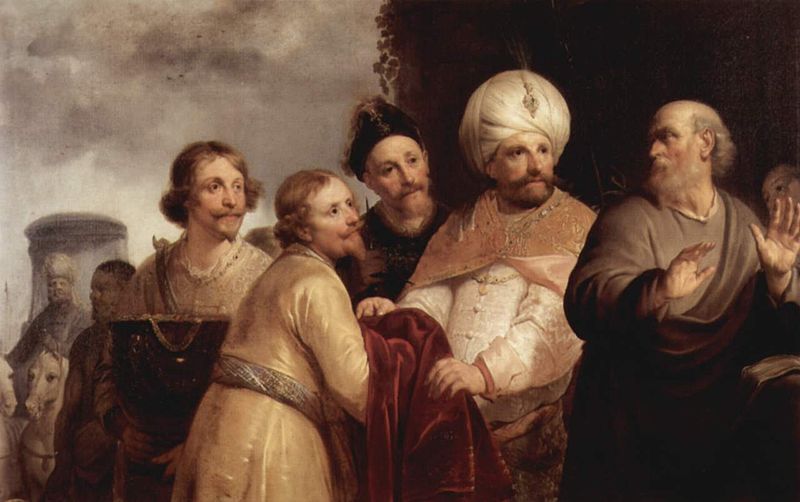Ronnie Delany of Ireland winning the 1500 metres in the Melbourne Olympics 1956
Since I was 13 Ronnie Delany has been a hero of mine. I posted about him in July 2012 under the heading Olympic Gold medallist: 'I had to say "thank you" to God for the gift I was given'. The Irish Catholic carries a story by Mags Gargan an dated 24 October 2013 under a very similar headline: Irish Olympian grateful for ‘God-given talent’
There you'll find what is an iconic photo for those of us who are Irish and remember Delany's win in Melbourne on 1 December 1956: his kneeling immediately afterwards to thank God. Some on the spot thought he had collapsed. He hadn't. In my previous post I quoted what he said in a radio interview some years ago in Ireland: I had to say 'thank you' to God for the gift I was given'. That's where the headline in The Irish Catholic comes from.
Down the years Ronnie Delany has spoken of the gift that God gave him and of his gratitude to God for it. To recognise a special gift from God and to develop and use that gift is real humility. Mags Gargan is reporting on a talk that he gave recently at a conference on Ethics and Sport organised by the Department of Religions and Theology in Trinity College Dublin.
Here is part of the article:
"I have a great sense of faith. I didn’t pray so much to win, I did say ‘God give me the ability to run to the best of my ability’. I knew if He gave me that gift I would win, so it was a bit of a cheeky way to go about it,” he said.
“No apology. I prayed before 120,000 people, before the world, because I wanted to say thank you. Thank you for the gift. Thank you too for the ability to explore my talent because if I hadn’t that, if I hadn’t taken key decisions in my life, if I hadn’t listened to my coach, if I hadn’t done the work he asked me to do, history would not have been written in terms of my participation in the Olympics.”
The 78-year-old veteran also talked about the importance of respect in sport, saying it was one of the great lessons he learned. “Respect for the colours you wear, respect for your club, you county, your country, your province. Respect is an enormous attribute for the younger athlete I think. Now arrogance prevents that respect coming through.
“Often times they don’t have respect, they disrespect, their values are different,” he said.
Ronnie Delany speaks of another aspect of humility: listening to others who can help us develop whatever talents God has given us and doing what is necessary to develop them. His coach in Villanova University, Philadelphia, run by the Augustinians, where he had an athletic scholarship, was 'Jumbo' Elliott. Elliott never won an Olympic medal but without him Delany would never have won one either.
Delany also spoke eloquently about respect. At the end of the video above, where veteran Irish sports commentator Jimmy Magee looks back on what was a moment of glory for everyone in Ireland, we see genuine respect: the winner thanking God for his victory and then John Landy of Australia who came third and other runners warmly congratulating him.
Ronnie Delany showed that respect in an interview with Kerry O'Brien in Sydney on the occasion of the 2000 Olympics there when he spoke so warmly about John Landy as a friend and rival:
KERRY O'BRIEN: Racing against a local hero?
RON DELANEY: Yes, hero and friend, because John, I'd raced him in America the previous summer, I'd raced him in Compton, raced him in Fresno, and he beat me handsomely both times, so I had a certain fear in my heart.
The rumour was that he was slightly injured and he's an enormous gentleman, enormous sportsman, so he was my friend as well as my adversary on that day.
And I had the good fortune to beat him.
John, of course, got third and I think he hates being reminded of that because he's done so many other marvellous things.
He was probably the greatest miler in the world at that time.
RON DELANEY: Yes, hero and friend, because John, I'd raced him in America the previous summer, I'd raced him in Compton, raced him in Fresno, and he beat me handsomely both times, so I had a certain fear in my heart.
The rumour was that he was slightly injured and he's an enormous gentleman, enormous sportsman, so he was my friend as well as my adversary on that day.
And I had the good fortune to beat him.
John, of course, got third and I think he hates being reminded of that because he's done so many other marvellous things.
He was probably the greatest miler in the world at that time.
John Landy showed his sportsmanship and respect for rivals in an extraordinary way in 1956. From Wikipedia: Landy is remembered for his performance in the 1500 metres final at the 1956 Australian National Championships prior to the Melbourne Olympic Games [photo above]. In the race, Landy stopped and doubled back to check on fellow runner Ron Clarke after another runner clipped Clarke's heel, causing him to fall early in the third lap of the race. Clarke, the then-junior 1500 metre world champion, who had been leading the race, got back to his feet and started running again; Landy followed. Incredibly, in the final two laps Landy made up a large deficit to win the race, something considered one of the greatest moments in Australian sporting history. Said the National Centre for History and Education in Australia, "It was a spontaneous gesture of sportsmanship and it has never been forgotten." A bronze sculpture of the moment when Landy helps Clarke to his feet is situated on the north west corner of Punt Road and Swan Street, Melbourne.
In August Pope Francis met the members of the Argentinian and Italian national football teams before they played against each other. He called on players to “live your sport as a gift from God, an opportunity not only to improve your talents, but also a responsibility”. And he returned to the idea that athletes should act as role models, encouraging them to set an example of loyalty, respect, and selflessness. “I have confidence,” he said, “in all the good you can do, especially among young people.”
Maybe Pope Francis had read or listened to interviews with Ronnie Delany! I don't think that the Irishman ever set out deliberately to be a role model. But by the way he lives his faith and with his deep sense of gratitude to God he is one even to young Irish people born long after he won his Olympic gold medal.
I had the pleasure of meeting Ronnie Delany in November 2011 at the annual dinner of the O'Connell Schools' Past Pupils Union. He is a man who still lives joyfully and still with that great sense of gratitude to God.
Stamp issued in Ireland on the 50th anniversary of Delany's win
-












.jpg/800px-Child_and_ox_ploughing,_Laos_(1).jpg)



